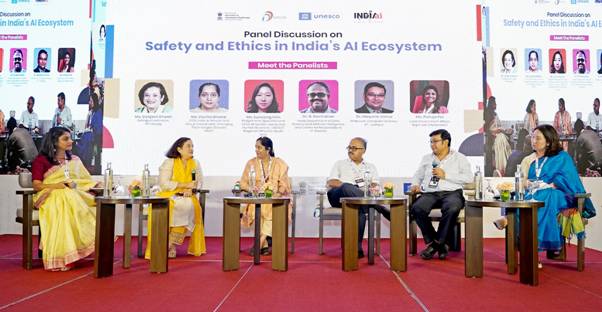UNESCO and MeitY Host the 5th Stakeholder Consultation on AI Readiness Assessment Methodology (RAM) in India

IN NEWS: UNESCO and MeitY Host the 5th Stakeholder Consultation on AI Readiness Assessment Methodology (RAM) in India
Analysis
- About the Consultation:
- The UNESCO Regional Office for South Asia, in collaboration with the IndiaAI Mission under the Ministry of Electronics and Information Technology (MeitY) and Ikigai Law as the implementing partner, organized the 5th and final stakeholder consultation on AI Readiness Assessment Methodology (RAM) in New Delhi on 3rd June 2025.
- This consultation follows four earlier sessions held in New Delhi, Bangalore, Hyderabad, and Guwahati.
- It aims to develop an India-specific AI policy report to map strengths, identify growth opportunities, and offer actionable recommendations for ethical and responsible AI adoption across sectors.
- Objective of the Initiative:
- The AI RAM serves as a diagnostic tool to support governments in strengthening regulatory and institutional capacity for AI governance.
- It aligns with India’s Safe and Trusted AI pillar under the IndiaAI Mission, ensuring AI development rooted in safety, accountability, and ethical standards.
- The goal is to promote indigenous frameworks, governance tools, and self-assessment mechanisms to democratize AI benefits and empower innovators.
- Key Highlights of the Event:
- Opening Remarks:
- Mr. Tim Curtis, Director, UNESCO Regional Office for South Asia, emphasized an “ethics-by-design” approach and reaffirmed UNESCO’s commitment to supporting India’s inclusive and transparent AI ecosystem.
- Keynote Address:
- Mr. Abhishek Singh, Additional Secretary, MeitY and CEO, IndiaAI Mission, highlighted India’s pro-innovation approach, focusing on building AI in India and for India through safe and trustworthy applications.
- He discussed initiatives such as the AI Kosh platform, foundation model development, and Responsible AI projects under the IndiaAI Mission.
- Opening Remarks:
- Panel Discussion:
- Panelists included Ms. Debjani Ghosh (NITI Aayog), Ms. Kavita Bhatia (MeitY), Ms. Eunsong Kim (UNESCO), Dr. B. Ravindran (IIT Madras), and Dr. Mayank Vatsa (IIT Jodhpur).
- Discussions revolved around policy initiatives, regulatory frameworks, and governance mechanisms for responsible AI adoption.
- Emphasis was placed on balancing AI’s transformative potential with the management of inherent ethical risks.
- Breakout Sessions:
- The consultation featured discussions across critical domains such as governance, infrastructure, workforce readiness, and sectoral adoption of AI.
- A dedicated session on youth participation in AI development reflected the emphasis on inclusive policymaking.
- Outcome:
- The deliberations contributed insights for shaping India’s AI policy roadmap, reinforcing multi-stakeholder engagement and collaboration between government, academia, industry, and civil society.
Static Part (Background Information)
- AI Readiness Assessment Methodology (RAM):
- A UNESCO framework comprising quantitative and qualitative indicators across multiple dimensions — legal and regulatory, social and cultural, economic, scientific, educational, and technological.
- The methodology is adapted to the unique national context, implemented through independent consultants or research organizations in collaboration with national stakeholders.
- It helps countries identify policy gaps, institutional needs, and infrastructural readiness for responsible AI development.
- IndiaAI Mission (MeitY):
- A national mission launched to promote AI innovation, research, and adoption across sectors.
- Anchored on pillars like AI Computing Infrastructure, AI Datasets Platform (AI Kosh), Skilling and Research, and Safe & Trusted AI.
- Seeks to make India a global hub for ethical, inclusive, and human-centric AI innovation.
- UNESCO’s Global Role in AI Ethics:
- UNESCO adopted the Recommendation on the Ethics of Artificial Intelligence (2021) — the first global normative framework on AI ethics.
- It promotes human rights-based, transparent, and inclusive AI governance worldwide.
Updated – 06 Jun 2025 ; 03:13 PM | PIB